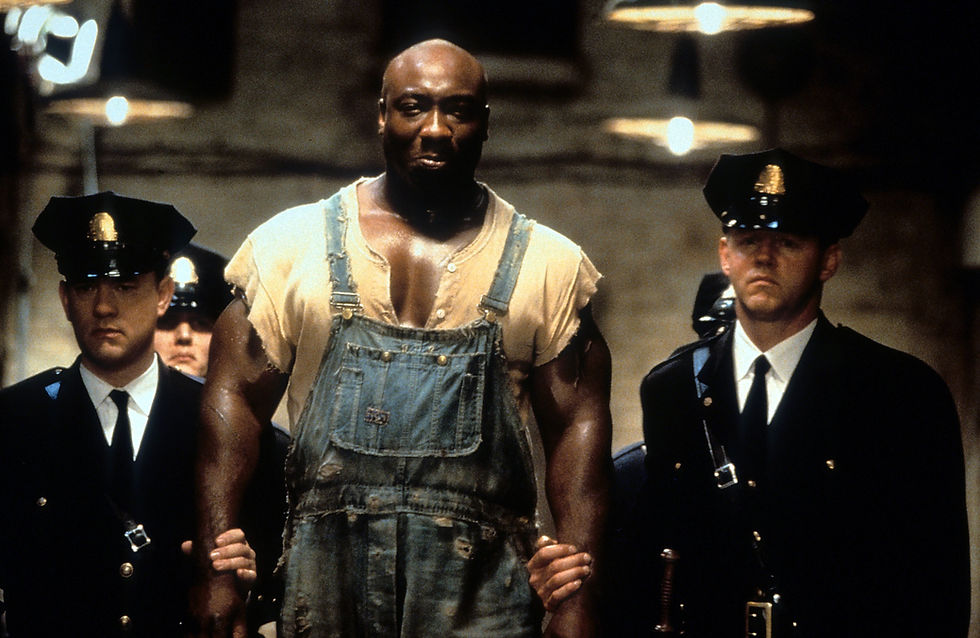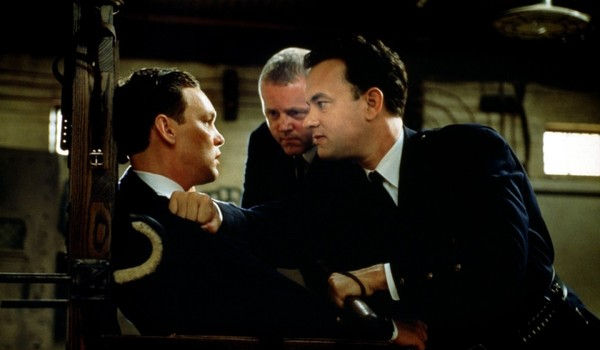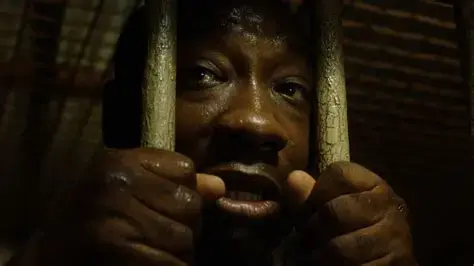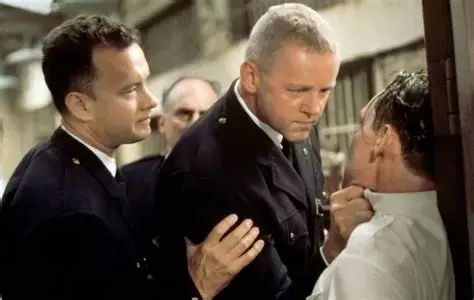The Green Mile (1999)
- Soames Inscker

- Jul 21, 2025
- 4 min read

Frank Darabont’s The Green Mile (1999) is a sprawling, deeply affecting film that fuses prison drama, supernatural mystery, and a meditation on morality and mortality. Based on Stephen King’s serialised novel of the same name, the film reunites Darabont with the themes of guilt, redemption, and human dignity that he so memorably explored in The Shawshank Redemption (1994).
With a soulful script, career-defining performances, and a haunting score, The Green Mile is a richly emotional cinematic journey that transcends genre and lingers long after the credits roll.
Plot Summary
The film is framed through the eyes of Paul Edgecomb (Tom Hanks), a former death row supervisor at Cold Mountain Penitentiary, who recounts his experiences from the 1930s during his time on "The Green Mile"—the nickname for the prison's death row corridor due to the green linoleum floor.
Paul’s world changes with the arrival of a new inmate, John Coffey (Michael Clarke Duncan), a massive, gentle black man convicted of the rape and murder of two young girls. Though imposing in stature, Coffey possesses a childlike innocence and a miraculous gift—the ability to heal physical and spiritual ailments through touch.
As Paul and his fellow guards (notably David Morse as the compassionate Brutus Howell) come to believe in Coffey’s innocence and witness his miraculous powers, they are forced to confront the moral complexities of justice, capital punishment, and divine intervention. Meanwhile, the cruel guard Percy Wetmore (Doug Hutchison) and deranged prisoner “Wild Bill” Wharton (Sam Rockwell) inject danger and chaos into the otherwise solemn proceedings.
Performances

Tom Hanks delivers one of his most quietly powerful performances as Paul Edgecomb. He carries the emotional weight of the film with grace and restraint, portraying a man struggling to uphold dignity in a place built for death. Hanks embodies empathy, duty, and conflicted conscience with understated brilliance.
However, it is Michael Clarke Duncan who delivers the film’s most astonishing performance. As John Coffey, Duncan is a revelation—his soulful eyes, soft voice, and mournful presence transform what could have been a symbolic character into a flesh-and-blood figure of tragic beauty. His Oscar-nominated performance remains one of the most emotionally resonant in modern cinema.

The supporting cast is uniformly excellent:
David Morse brings tenderness to the role of Brutus, reinforcing the humanity behind the prison walls.
James Cromwell, as the warden, lends authority and sorrow to a man caught between his duty and his moral compass.
Doug Hutchison is chillingly effective as Percy, a sadistic coward whose abuse of power is all too believable.
Sam Rockwell nearly steals the show as the wildly unpredictable “Wild Bill,” injecting madness and menace in every scene.
Direction and Screenplay

Frank Darabont once again proves himself a master of adapting Stephen King’s work to the screen. His direction is deliberate and unhurried, allowing the story’s emotional depth and character development to blossom organically. The film’s nearly three-hour runtime never feels indulgent, but rather necessary to the slow-burning drama and weighty themes.
Darabont’s screenplay is remarkably faithful to King’s text and succeeds in blending the gritty realism of prison life with spiritual and metaphysical elements. He explores capital punishment, racism, guilt, and redemption without resorting to sentimentality or moralising.
Cinematography and Score
David Tattersall’s cinematography captures the oppressive yet strangely serene atmosphere of the death row block. The contrast between the prison’s claustrophobic interiors and the occasional flashes of the outside world (such as the radiant light during Coffey’s healing scenes) underscores the tension between life and death, despair and hope.
Thomas Newman’s score is evocative and elegiac, weaving gently through the narrative to amplify its emotional core without ever becoming overbearing. It’s one of Newman’s most memorable works, underscoring the film’s sorrow and quiet wonder.
Themes and Symbolism
At its heart, The Green Mile is a modern parable. John Coffey is presented as a Christ-like figure—wrongfully condemned, persecuted for the sins of others, capable of healing and grace. His initials (“J.C.”), miraculous powers, and ultimate sacrifice are unmistakably symbolic, but Duncan’s performance and Darabont’s direction keep these motifs grounded in genuine emotion.
The film also delves deeply into the dehumanising nature of the death penalty. While set in the 1930s, its critique of capital punishment remains timely and relevant. Each execution is portrayed with harrowing gravity, particularly the botched one involving Percy—a scene that is as horrifying as it is heartbreaking.
Racism, injustice, and moral ambiguity all find space within this complex narrative. It’s a film that challenges viewers to consider the capacity for good and evil in all people, and the responsibility of those in power.
Criticism
While The Green Mile received widespread acclaim, some critics found its pacing overly slow or its spiritual themes heavy-handed. Others have noted the "magical Negro" trope embodied by Coffey, a frequent criticism of Hollywood narratives that place black characters in messianic roles to further the emotional journey of white protagonists.
However, these concerns are often mitigated by the film’s genuine emotional impact and the humanity of Duncan’s performance, which transcends stereotype to deliver something soulful and deeply affecting.
Legacy
The Green Mile was a critical and commercial success, earning four Academy Award nominations (including Best Picture, Best Supporting Actor for Duncan, Best Adapted Screenplay, and Best Sound). Over time, it has grown in stature as a modern classic, frequently cited as one of the best adaptations of Stephen King’s work and one of the most poignant prison dramas ever made.
It stands as a testament to the power of compassion, the tragedy of injustice, and the mystery of grace.
Conclusion
Frank Darabont’s The Green Mile is a rare cinematic achievement: a film that stirs the heart, challenges the mind, and lifts the soul. Richly acted, beautifully written, and deeply humane, it is a spiritual odyssey cloaked in a prison drama. With unforgettable performances—especially from Michael Clarke Duncan—it reminds us of the weight of human life and the light that can be found in the darkest of places.
Rating:
A timeless, soul-stirring journey through despair and redemption.





